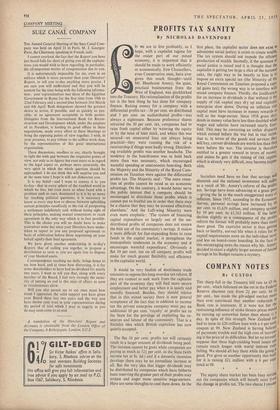PROFITS TAX SANITY
By NICHOLAS DAVENPORT
IF we are to live profitably, as I hope, with a capitalist regime for the major part of our mixed economy, it is important that it should be made to work efficiently or economically. Few Chancellors, even Conservative ones, have ever given this much thought—until Mr. Heathcoat Amory, the quiet, practical businessman from the West of England, was pitchforked into the Treasury. His rationalisation of the profits tax is the best thing he has done for company finance. Raising money for a company with a differential profits tax-30 per cent. on distributed and 3 per cent. on undistributed profits—was always a nightmare. Because preference shares attracted the 30 per cent. tax, companies had to raise fresh capital either by watering the equity or by the issue of loan stock, and where this was secured—an unsecured loan not always being practical—they were running the risk of a receivership if things went badly wrong. Distribut- ing available profits was another headache. The tendency in the boardrooms was to hold back more than was necessary, which encouraged wasteful spending or uneconomic hoarding. Both the Majority and the Minority of the Royal Com- mission on Taxation were against the differential profits tax. The Majority said : The mere reten- tion of profits cannot be rated as an economic advantage. On the contrary, it would better serve the, public interest that a company should be encouraged to distribute those profits which it cannot put to fruitful use in order that there may be a chance that they may be invested effectively elsewhere.' And the Left-wing Minority were even more emphatic : 'The system of financing capital expenditure so largely out of the un- distributed profits of companies does not ensure the best use of the community's savings. It makes it more difficult for fast-expanding firms to raise funds in the capital market; it strengthens the monopolistic tendencies in the economy and it encourages wasteful expenditure.' Obviously a flat 10 per cent. tax on all company profits will make for much greater flexibility and efficiency in the capitalist world.
* * It would be very foolish of doctrinaire trade unionists to oppose this long-overdue tax reform. If they are content to seek work from the capitalist part of the economy they will find more secure employment and better pay when it is sanely and soundly financed. Besides, they should rejoice that in this mixed society there is now general acceptance of the fact that in addition to income tax the private enterprise company must pay an additional 10 per cent. 'royalty' or profits tax to the State for the privilege of exploiting the re- sources and labour of the community. That is a Socialist idea which British capitalism has now quietly accepted.
* * *
The flat 10 per cent. profits tax will certainly result in a larger amount of dividends being paid. The increase cannot be great while companies are paying as much as 521 per cent. to the State (with income tax at 8s. 6d.) and if a domestic recession develops there may be no immediate increase at all. But the very idea that bigger dividends may be distributed by companies which have hitherto been reserving the greater part of their profits may irritate and anger some sensitive wage-earners. Here are some thoughts to cool them down. In the
first place, the capitalist sector does not exist to administer social justice; it exists to create wealth' The tax system should not impede the efficient production of wealth. Secondly, if the question of social justice is raised and it is thought that the, capitalist is getting too large a slice of the national cake, the right way to be beastly to him is 10 impose an extra special tax (the Minority of the Royal Commission on Taxation proposed a cal* tal gains tax); the wrong way is to interfere with sound company finance. Thirdly, the justification for an increase in dividends is that without it the supply of rick capital may dry up and capitalist enterprise slow down. During an inflation risk capital must have increases in money rewards as well as the wage-earner. Since 1938 gross divi• dends in money value have less than doubled vvbile wages and salaries have increased nearly four- fold. This may be correcting an unfair disparitY which existed before the war but in real terms, that is, in terms of the goods and services they will buy, current dividends are worth less than they were before the war. The investor is therefore entitled to a greater reward in terms of mooch and unless he gets it the raising of risk capital, which is already very difficult, may become imPos" sible.
Socialists need have no fear that savings Neill diminish and the national investment will suffer as a result of Mr. Amory's reform of the profits tax. Savings have been advancing at a great pace e —giving the lie to the much exaggerated scare 13/ inflation. Since 1955, according to the Economy Survey, personal savings have increased by 6° per cent. to £1,639 million, and company savings by 10 per cent. to £1,763 million. If the latter decline slightly as a consequence of the profits reform the former will probably more than make them good. The capitalist sector is thus getting back to healthy, normal life when it relies for its capital requirements more on the individual saver, and less on board-room hoarding. In the face 01. this encouraging news the reason why Mr. Amory decided to exact a slightly larger amount of forced savings in his Budget remains a mystery.














































 Previous page
Previous page